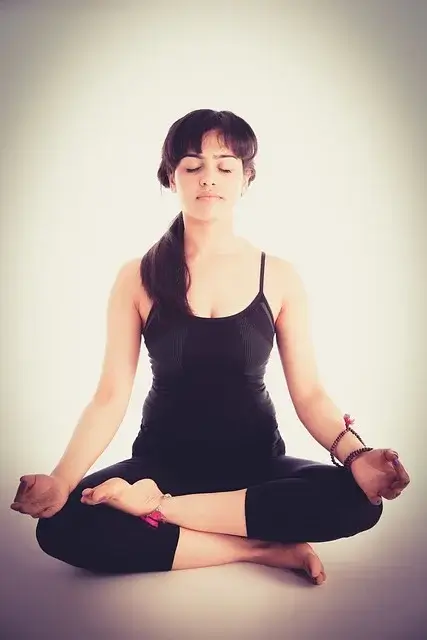Do you feel anxiety? Do you want to come out of it. The article How to Control Anxiety without Medication: (Stress Management Techniques) says that Anxiety is the worse form of stress. we need to understand about stress to control anxiety.
Stress has become a normal part of living in today’s society. If we don’t handle it correctly, it may be harmful to both our physical and mental well-being. Stress management techniques are crucial for preserving our well-being and efficiency. We’ll discuss some practical strategies for stress management in this article. How to Control Anxiety without Medication?
We know that keeping a healthy lifestyle requires effective stress management. However, in today’s society and constantly changing world, it can be challenging to know where to begin when it comes to stress management. You can come out from anxiety by following some stress management techniques given in this article How to Control Anxiety without Medication: (Stress Management Techniques)
What is Stress

It’s essential to know what stress is before moving on to the techniques. Stress is a normal response to a perceived threat or difficulty. Numerous circumstances, including stress at work, strained relationships, money difficulties, and health issues, can cause it. Headaches, tense muscles, anxiety, and irritability are a few physical and mental symptoms of stress are given in this article – How to Control Anxiety without Medication: (Stress Management Techniques).
Causes of stress
The article How to Control Anxiety without Medication: (Stress Management Techniques) says some common causes of stress:
Work-related stress: There are many typical sources of work-related stress, including the requirement to make deadlines, long workdays, conflicts with coworkers or superiors, and job insecurity.
Financial stress: Stress can be caused by worries related to money, debt, and financial uncertainty.
Relationship stress: Issues with romantic relationships, problems in the family, and societal separation can all lead to stress.
Health-related stress: Stress can be a result of long-term medical issues, disease, or accident.
Life transitions and changes: Significant life changes, like getting married, having a child, relocating, or beginning a new job, can be stressful.
Environmental stress: Pollution, disasters caused by nature, and other environmental factors can all contribute to stress.
Trauma and abuse: Stress and anxiety may continue after experiencing trauma or violence.
Personal stressors: Insufficient time for self-care and relaxation, overcommitting to too many activities or duties, and feeling overburdened by daily tasks are a few examples of this.
The article How to Control Anxiety without Medication: (Stress Management Techniques) says that It’s essential to identify the stressors in your life and take steps to handle them successfully.
Effects of stress
The article How to Control Anxiety without Medication: (Stress Management Techniques) says that the human body and mind can be affected by stress in a number of ways, including:
Physical effects: Stress can result in physical signs like headaches, muscle tension, pain in the chest, and digestive issues.
Emotional effects: Stress can cause worry, depression, irritability, and mood swings on an emotional level.
Effects on cognition: Stress can have an impact on cognitive processes like memory, focus, and decision-making.
Effects on behaviour: Stress can cause behavioural changes, such as overeating, undereating, or abusing drugs.
Effects on interpersonal relationships: Stress can cause disagreement or social withdrawal in interpersonal relationships.
Health effects: Long-term stress can raise your chance of developing conditions like heart disease, diabetes, and mental health issues.
Overall, The article How to Control Anxiety without Medication: (Stress Management Techniques) says that it is essential to effectively handle stress because it can have a negative influence on one’s physical, emotional, and mental health.
What is Stress Management?
The variety of methods, plans, and treatments used to help individuals control their stress is known as stress management. This can include reducing acute stress, but its main goal is typically to reduce chronic stress in order to enhance one’s health, contentment, and general well-being.
The Importance of Stress Management
Stress is a normal reaction to difficult circumstances, and it can motivate us and improve our performance under force. On the other hand, continuous or chronic stress can harm our physical, emotional, and mental wellbeing.
We must learn to handle stress effectively to maintain our health and enhance our quality of life. The article How to Control Anxiety without Medication: (Stress Management Techniques) gives a few explanations for why stress control is important:
Reduce the negative effects of stress: Long-term stress can have a negative impact on our health, resulting in issues with both our physical and emotional well-being. Techniques for managing stress can help minimize the negative impacts of stress, such as decreasing blood pressure and reducing feelings of anxiety and depression.
Improvement in our Mental Health: A reduction in stress can help our mental health, as it can cause depression and worry. By decreasing anxiety and nurturing relaxation, stress-management methods like mindfulness and meditation can help us have better mental health.

Performance improvement: Although stress can make us work better under pressure, too much stress can hurt us. We can find the ideal balance between tension and performance with the aid of effective stress management, which allows us to perform at our very best.
Relationship improvement: Stress can have an adverse impact on our relationships with others, causing tension and conflict. Effective stress management can enhance interpersonal interactions and conversation.
Overall, The article How to Control Anxiety without Medication: (Stress Management Techniques) says that stress management is essential for preserving our mental, emotional, and physical health as well as for improving our performance and interpersonal interactions. The article How to Control Anxiety without Medication: (Stress Management Techniques) says that we can decrease the negative effects of stress and raise our quality of life by studying and putting stress management methods into practice.
Techniques for Stress Management
The article How to Control Anxiety without Medication: (Stress Management Techniques) says about the techniques for stress management
1. Exercise: Exercise can improve mood and lower tension. It causes the body to produce endorphins, which can help counteract the negative impacts of stress. Additionally, exercise helps with sleep, which is essential for stress reduction.
2. Mindfulness Meditation: This method entails concentrating on the current moment and accepting it without criticism. Stress, anxiety, and sadness may be decreased with its assistance. Focus and brain performance can both be enhanced by regular mindfulness meditation.
3. Deep Breathing: Exercises that involve deep breathing can help to relieve stress and calm the psyche. The 4-7-8 method can be used, which calls for inhaling for 4 seconds, holding your breath for 7 seconds, and then exhaling for 8 seconds.
4. Progressive Muscle Relaxation: To relieve stress and physical tension, this method involves tensing and relaxing various muscle groups. It may support relaxation and enhance sleep.
5. Time Management: Stress and worry can result from bad time management. To handle your time more efficiently and relieve stress, use tools like calendars, to-do lists, and prioritization.
6. Social Support: Stress can be reduced by talking to peers, family, or a therapist. It gives emotional support and aids in gaining balance.
7. Hobbies and Creative Outlets: Hobbies and artistic pursuits can help to ease tension and encourage relaxation. Painting, listening to music, or gardening are some activities that can help to divert the mind from troubling ideas.
8. Aromatherapy: Stress reduction and calm can be aided by using essential oils like peppermint, lavender, and chamomile. Essential oils can be applied to the skin with a rollerball, diffused, or dissolved in water for a massage.
9. Laughter: An effective tension reliever is laughter. In addition to promoting relaxation and elevating happiness, it releases endorphins. Spend time with people who make you laugh, watch a funny movie, or read a funny book.
10. Sleep: For stress management, getting enough sleep is essential. Irritability, lack of focus, and bodily tension can result from lack of sleep. For relaxation and overall well-being, aim for 7-8 hours of sleep each night.
Conclusion
Stress has become a normal part of living in today’s society. If we don’t handle it correctly, it may be harmful for both our physical and mental wellbeing. How to Control Anxiety without Medication: (Stress Management Techniques) says that stress management is essential for preserving our mental, emotional, and physical health as well as for improving our performance and interpersonal interactions. We can decrease the negative effects of stress and raise our quality of life by studying and putting stress management methods into practice like Exercise, Time Management, mindfulness meditation, etc.
FAQs
What is the first thing you need to do when dealing with stress?
The first step in managing stress is to realize and understand that you are experiencing stress. This entails pausing to consider your feelings and thoughts while identifying the specific cause or sources of stress. know more by reading this article the article How to Control Anxiety without Medication: (Stress Management Techniques)
What is an effective method to manage stress and its effects?
Regular relaxation practise is an efficient way to control stress and its affects. Deep breathing techniques, progressive muscular relaxation, guided mental imagery, and meditation fall under this category. You can use these methods to relax your body and mind, lessen stress and worry, and increase feelings of well-being. know more by reading this article the article How to Control Anxiety without Medication: (Stress Management Techniques)
What is the relationship between stress and health?
The effects of stress can be felt both mentally and physically. Your body releases hormones like cortisol and adrenaline in reaction to stress, which can set off the “fight or flight” response. While this reaction is useful in emergency circumstances, ongoing stress can have a variety of negative effects on one’s health. know more by reading this article the article How to Control Anxiety without Medication: (Stress Management Techniques)
What is anxiety?
A mild to severe sense of unease, worry, or dread is known as anxiety. It is a typical reaction to difficult circumstances, and it can occasionally be beneficial. Anxiety can be categorised as an anxiety disorder, though, when it manifests as excessive, ongoing interference with everyday life.
What are the risk factors/triggers for anxiety disorders?
Although there is no one specific cause of anxiety disorders, a number of factors can raise a person’s risk. Several typical anxiety disorder causes or risk factors include: Genetics, Brain chemistry, Trauma, Chronic stress, Medical conditions and Substance abuse.
Everyone feels stress and anxiety occasionally, but for some people, these emotions can become overwhelming and interfere with day-to-day activities. It’s crucial to get professional assistance if you’re showing signs of an anxiety condition.
What are the symptoms?
Excessive nervousness or worry about regular occurrences, Feeling frustrated, aggrieved or tense, Inability to sleep or relax,
Physical signs like exhaustion, tension headaches, or muscular aches, avoidance of certain situations or tasks as a result of anxiety or fear, Shortness of breath, sweating, and heart beats are just a few signs and symptoms of panic attacks, compulsive actions or intrusive, unwanted ideas.
What are the treatment options for anxiety disorders? How to Control Anxiety without Medication: (Stress Management Techniques)
For anxiety disorders, there are numerous treatment options accessible. These consist of:
behavioral therapy (CBT) is a treatment method that is frequently applied for anxiety conditions. It centres on recognising and altering unfavourable thought patterns and actions that fuel anxiety.
Treatment for anxiety conditions frequently involves the use of antidepressants like benzodiazepines and selective serotonin reuptake inhibitors (SSRIs).
Changes in lifestyle: Regular exercise, a balanced diet, and adequate sleep can all help to lessen the symptoms of worry.
Meditation, deep breathing exercises, and progressive muscle relaxation are all relaxation methods that can help with anxiety symptoms.
Support groups: Becoming a member of a support group can give people with anxiety disorders a feeling of belonging and make them feel less alone.
Working with a mental health expert will help you choose the most appropriate course of action for your particular needs.

